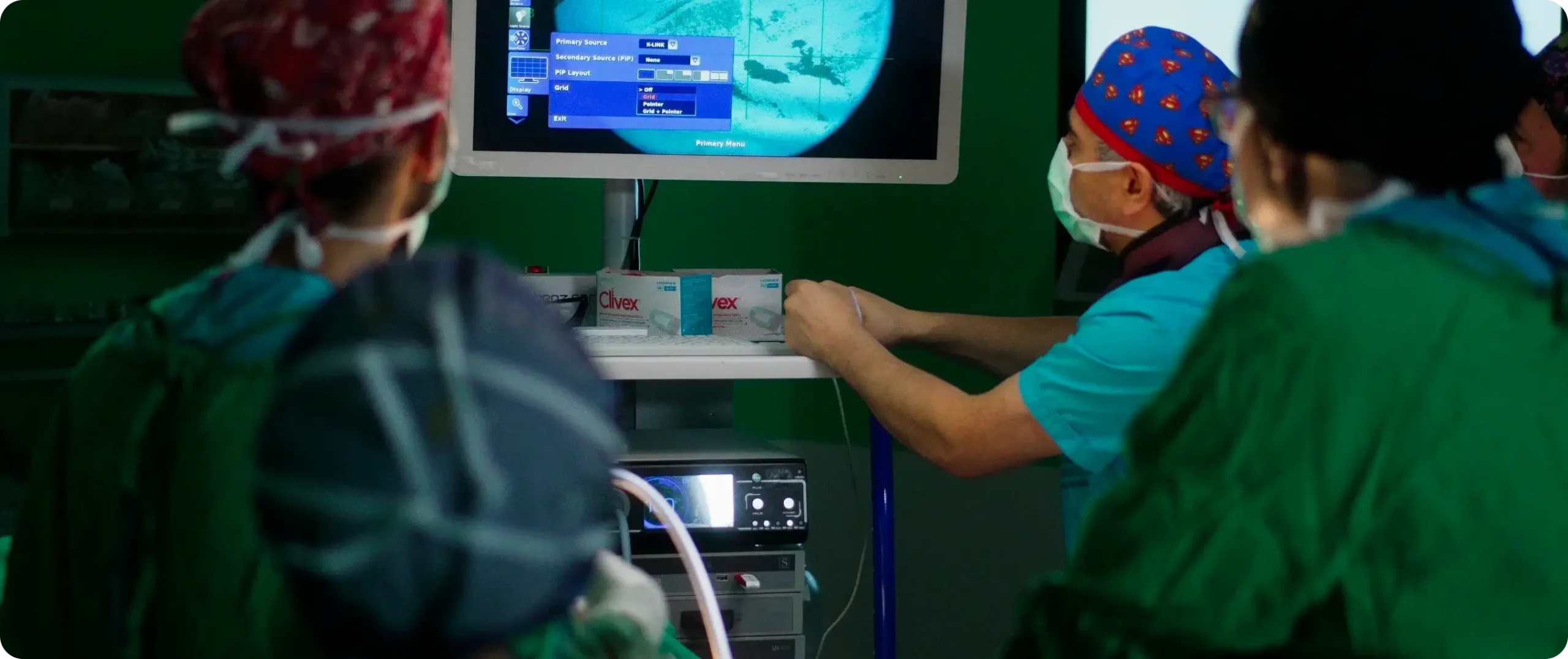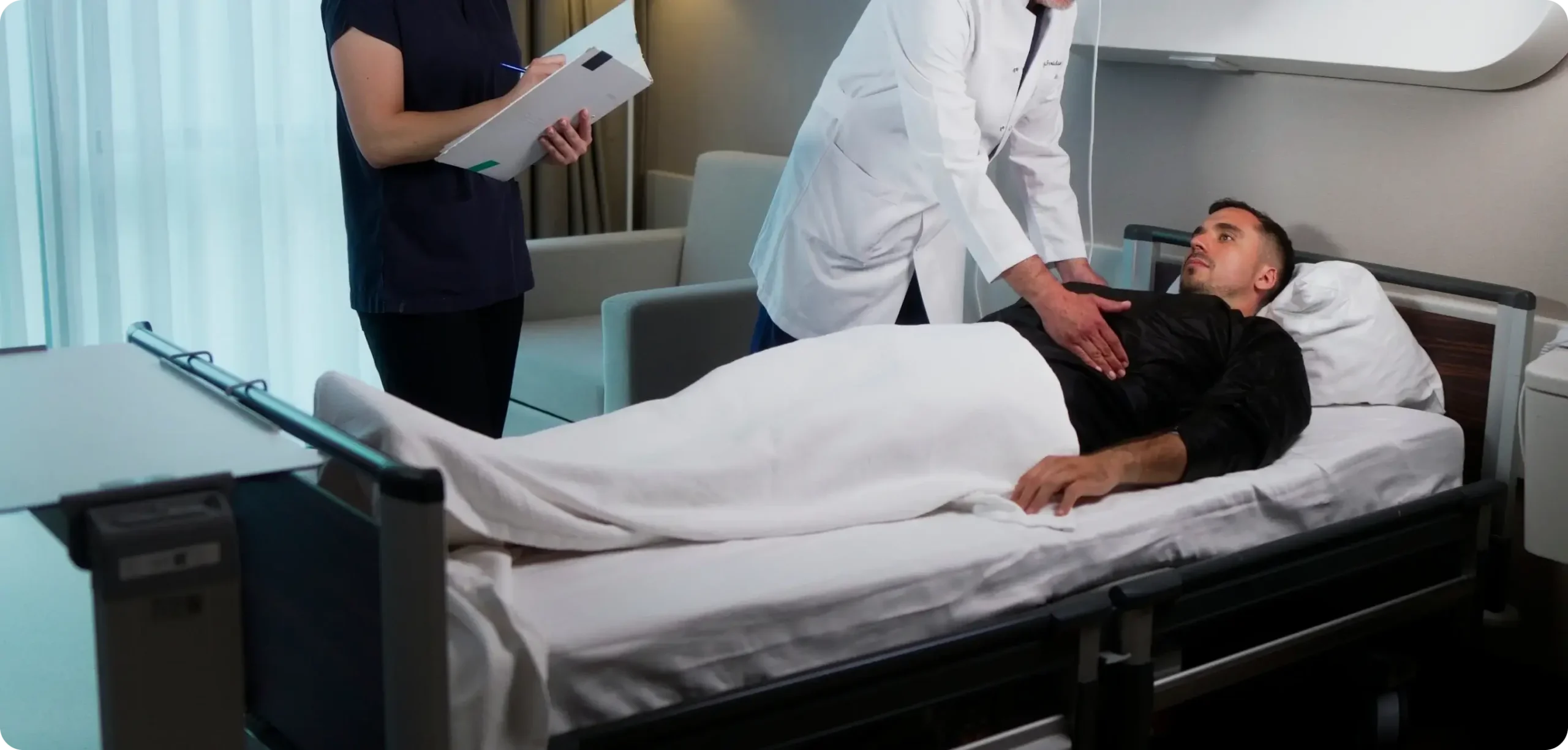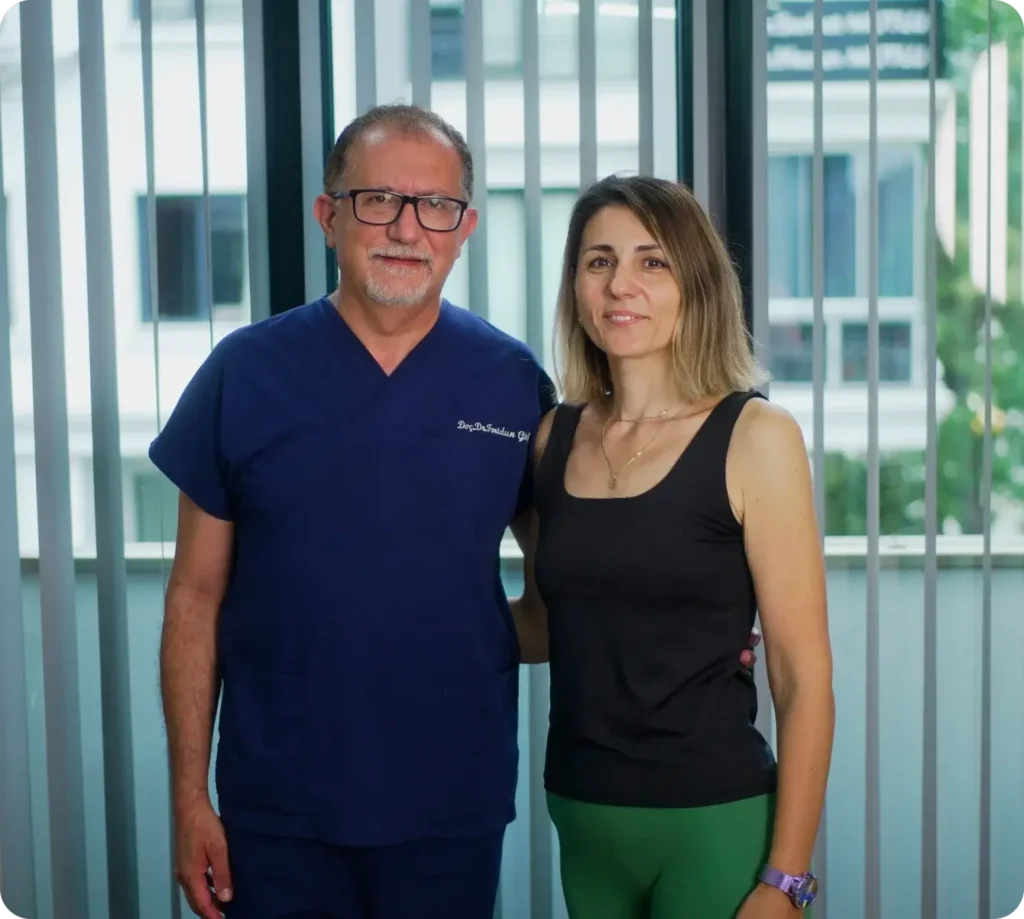
Gastric sleeve surgery is a recognized standard procedure to combat obesity and the associated negative health effects. With a gastric sleeve, the volume of the stomach is reduced by up to 80%. This quickly results in a feeling of satiety, which in turn enables significant, lasting weight loss. The negative effects of diseases such as diabetes or sleep apnea are significantly reduced.

Then you should choose another treatment. The benchmark for gastric sleeve surgery is a BMI of 40 (from 35 with concomitant diseases)
In the case of certain pre-existing conditions, e.g. of the liver and kidneys, it must be weighed up to what extent the risk of surgery is acceptable.
Infections, e.g. in the gastrointestinal tract, may make it advisable to postpone the operation.
If you are pregnant, you should postpone the operation. Similarly, there should be no psychological factors such as eating disorders, addictions or severe depression.

70%

"*" indicates required fields
Gastric sleeve surgery, also called sleeve gastrectomy, is a widely trusted surgical procedure for treating severe obesity. It has helped many patients with a high body mass index (BMI) to achieve lasting results. By permanently reducing the size of the stomach, the surgery significantly limits the amount of food a person can eat. This helps patients to feel full faster, making it easier to lose weight and maintain a healthier lifestyle.
The benefits go beyond weight loss. For many, the surgery has proven effective in reducing the risk of obesity-related health problems, such as high blood pressure and sleep apnea. With proper follow-up care and adherence to a healthy lifestyle, the results are often successful long term.
Performed through small incisions in the abdomen, the procedure is minimally invasive, which means shorter recovery times. Most patients require only a short hospital stay and can resume daily activities within weeks.
Opting for weight loss surgery in Turkey is increasingly popular, as clinics offer attractive packages. These include expert medical care, comfortable accommodations, and comprehensive aftercare. A stay in Turkey combines effective treatment with affordability, making it a practical choice for many.
While the results can be life-changing, the outcomes can vary depending on the patient’s commitment to post-surgery recommendations. Eating several small meals a day and sticking to new dietary habits are key to maintaining weight loss.
Compared to other treatments, like the gastric band, gastric sleeve surgery delivers faster, more consistent results. It’s a proven way to regain control of your health, lose excess weight, and experience improved overall well-being. Patients find themselves not only healthier but also ready to embrace a more active and fulfilling life.
➳ Learn more about gastric bypass and gastric balloon procedures in Turkey with Dr. Gökçe.
The gastric sleeve procedure combines a high level of effectiveness with few side effects and rare complications. From an “operational” point of view, the gastric sleeve is simpler than, for example, a gastric bypass. The gastric sleeve has proven particularly effective for extreme obesity and is performed worldwide. Due to the significantly lower stomach content, a feeling of satiety quickly sets in naturally, so that you eat significantly less without “hungering” and thus reduce your weight. The change in metabolism has a positive effect in connection with type 2 diabetes.
The sleeve gastrectomy is particularly recommended and used for severe obesity. In particular, when other measures have not led to the desired improvement, sleeve gastrectomy is an effective way to combat severe obesity (grades 2 to 3) – i.e. from a BMI of 35. Under certain circumstances, a sleeve gastrectomy may also be advisable for lower BMI values.
The recovery period after gastric sleeve surgery varies from patient to patient, but you should generally plan for about 2 to 4 weeks. During the first few days, you will stay in the clinic for observation and can then be released home. During the first few weeks, it is important to take it easy physically and to strictly adhere to the prescribed diet to aid the healing process. After about three weeks, you can resume light everyday activities, while more intense physical exertion should only be undertaken after consulting your doctor.
After gastric sleeve surgery, it is crucial that body and mind adapt to the changed circumstances. Your stomach is significantly smaller, so you need to make fundamental changes to your eating habits. It is particularly important to have a nutritional program that aims to supply the necessary nutrients in smaller quantities. It makes sense to eat several small meals a day that are easy to digest and do not overload the stomach. To ensure that your body is adequately supplied despite the reduced food intake, dietary supplements such as vitamins and minerals may be necessary. This applies in particular to B-group vitamins, vitamin D, iron and calcium, as these nutrients are often not absorbed in sufficient quantities through food after sleeve gastrectomy. Our team of experts will provide you with an individual nutrition plan and will be happy to answer any questions you may have.
Dr. Gökce has helped thousands of patients to a better life over the decades. The testimonials speak for themselves! You are welcome to find out more about our patients’ personal experiences under the menu item results.
Yes, gastric sleeve surgery can have a positive impact on certain health conditions, including type 2 diabetes. By reducing the size of the stomach and changing eating habits, the surgery often leads to significant weight loss, which can improve blood sugar levels. Many patients report that their diabetes becomes easier to manage or even goes into remission after surgery. Additionally, the procedure has been shown to positively affect metabolism, further aiding in the control of blood sugar levels. However, the extent of improvement can vary depending on individual factors such as age, duration of diabetes, and adherence to post-surgery recommendations. Always discuss your specific health conditions with your surgeon before deciding on the procedure.
While gastric sleeve surgery is generally safe, as with any surgical procedure, there are potential side effects. Common side effects include nausea, acid reflux, and fatigue during the first few weeks. These symptoms typically improve as the body adjusts to the smaller stomach and new eating habits. Rare complications can include bleeding, infections, or leakage at the staple line where the stomach is sealed. Long-term side effects may involve vitamin and mineral deficiencies, especially if dietary supplements are not taken as recommended. For this reason, patients often require regular monitoring and follow-up care to ensure they maintain a healthy balance of nutrients. By carefully following your doctor’s guidance, you can reduce the risk of complications and enjoy the benefits of significant weight loss.